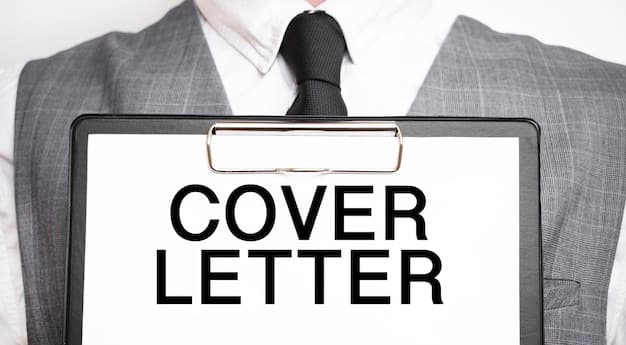The Complete Guide to Writing a Cover Letter That Gets You Noticed

The Complete Guide to Writing a Cover Letter That Gets You Noticed offers practical strategies for crafting compelling cover letters. Learn how to personalize your letter, highlight relevant skills, and make a strong impression on potential employers to stand out from the competition.
Crafting a cover letter that truly grabs attention can feel like a daunting task. You might wonder, “How can I possibly stand out from the stack of applications?” The key lies in understanding that your cover letter is more than just a formality; it’s your chance to tell your story. This complete guide breaks down the essential elements, offering actionable advice to help you write a standout cover letter.
In the complete guide to writing a cover letter that gets you noticed, you’ll discover how to personalize your message, tailor your skills to the specific job, and showcase your unique value proposition. Let’s dive in and transform your cover letter from a requirement into a powerful asset.
Why Your Cover Letter Matters
In today’s competitive job market, a well-crafted cover letter can be the deciding factor between landing an interview and being overlooked. It’s your opportunity to make a personal connection with the hiring manager and explain why you’re the perfect fit for the role and the company.
The First Impression
Your cover letter is often the first impression you make on a potential employer. It’s crucial that it’s professional, well-written, and tailored to the specific job you’re applying for. A generic, poorly written cover letter can send the message that you’re not serious about the opportunity.
Beyond the Resume
While your resume provides a summary of your skills and experience, your cover letter allows you to elaborate on those qualifications and explain how they align with the requirements of the job. It’s also a chance to showcase your personality and enthusiasm for the role.
- Showcase Your Personality: A cover letter lets you show who you are beyond your resume.
- Highlight Relevant Skills: Tailor your skills to fit what the job needs.
- Make a Personal Connection: Engage the hiring manager directly.
Ultimately, your cover letter is a powerful tool for convincing the hiring manager that you’re the right person for the job. By taking the time to craft a compelling and personalized letter, you can increase your chances of landing an interview and taking the next step in your career.

The Complete Guide to Writing a Cover Letter That Gets You Noticed
Now, let’s delve into the specifics of writing a cover letter that stands out. This guide will provide you with a step-by-step approach, covering everything from formatting to content, ensuring that your letter makes a lasting impression. The complete guide to writing a cover letter that gets you noticed involves careful planning and execution.
Start with Research
Before you start writing, take the time to research the company and the specific role you’re applying for. Understand their mission, values, and culture. This will help you tailor your cover letter to their specific needs and demonstrate your genuine interest in the opportunity.
Structure Your Letter
A well-structured cover letter is easy to read and highlights the most important information. Generally, your cover letter should include the following:
- Opening Paragraph: Introduce yourself and express your interest in the position.
- Body Paragraphs: Highlight your relevant skills and experience, and explain how they align with the job requirements.
- Closing Paragraph: Reiterate your interest in the position and thank the hiring manager for their time.
Crafting a cover letter that truly sets you apart involves several key elements. Begin by thoroughly researching the company and the specific role you’re targeting. Show them you care by structuring your letter well and tailoring it with relevant skills and experience.
Tailoring Your Cover Letter for Each Job
One of the biggest mistakes job seekers make is using a generic cover letter for every application. To truly stand out, you need to tailor your cover letter to each specific job. This shows the hiring manager that you’ve taken the time to understand their needs and that you’re genuinely interested in the opportunity.
Analyze the Job Description
Carefully review the job description and identify the key skills and qualifications they’re seeking. Then, highlight those skills in your cover letter, providing specific examples of how you’ve demonstrated them in the past. The process of tailoring **the complete guide to writing a cover letter that gets you noticed** must align with the job description.
Use Keywords
Many companies use applicant tracking systems (ATS) to screen resumes and cover letters. To ensure that your application makes it through the initial screening process, use keywords from the job description throughout your cover letter. In order to follow **the complete guide to writing a cover letter that gets you noticed**, you should include keywords that are specific to the job.

Show, Don’t Just Tell
Instead of simply stating that you have a particular skill, provide specific examples of how you’ve used that skill to achieve results. For example, instead of saying “I’m a strong communicator,” say “I successfully led a team of five in developing and implementing a new marketing strategy, resulting in a 15% increase in sales.”
Creating a compelling cover letter requires a personalized touch. Researching the job description, integrating relevant keywords, and backing up your claims with specific examples will significantly enhance your chances of capturing the hiring manager’s attention.
Highlighting Your Accomplishments
Your cover letter is your opportunity to showcase your proudest accomplishments and demonstrate the value you can bring to the company. Don’t be afraid to brag a little, but make sure you back up your claims with concrete evidence.
Quantify Your Results
Whenever possible, quantify your accomplishments with numbers. This makes your achievements more tangible and demonstrates the impact you’ve had in your previous roles. Did you increase sales by a certain percentage? Did you reduce costs by a specific amount? Include those numbers in your cover letter. When writing **the complete guide to writing a cover letter that gets you noticed** it’s important to use numbers to show accomplishments.
Focus on Relevance
Highlight the accomplishments that are most relevant to the job you’re applying for. Don’t waste space talking about achievements that aren’t directly related to the requirements of the role. Be sure to keep in mind that **the complete guide to writing a cover letter that gets you noticed** requires a focus on relavence to the job you’re applying for.
Tell a Story
Instead of simply listing your accomplishments, tell a story about how you achieved them. This makes your accomplishments more engaging and helps the hiring manager understand the context in which you achieved them. Tell the story about how you followed **the complete guide to writing a cover letter that gets you noticed**.
By focusing on your most relevant and impactful accomplishments, you can effectively demonstrate the value you bring to the table. Quantifying your results and telling a compelling story will further enhance your cover letter, showcasing your capabilities in a memorable way.
Avoiding Common Mistakes
Even the most well-written cover letter can be undermined by common mistakes. Proofreading carefully and avoiding these pitfalls can significantly increase your chances of success.
Grammar and Spelling Errors
Nothing undermines your credibility faster than grammar and spelling errors. Proofread your cover letter carefully, or ask someone else to proofread it for you. Using **the complete guide to writing a cover letter that gets you noticed** can help avoid grammer errors.
Generic Language
Using generic language makes your cover letter sound impersonal and insincere. Avoid phrases like “I’m a hard worker” or “I’m a team player.” Instead, provide specific examples of how you’ve demonstrated those qualities in the past.
Too Long or Too Short
A cover letter should be concise and to the point. Aim for a single page, and avoid rambling on for too long. However, also make sure you provide enough detail to showcase your skills and accomplishments. A large componenet of **the complete guide to writing a cover letter that gets you noticed** is finding that perfect balance between too long and too short.
By taking care to proofread your work, avoiding generic language, and maintaining a concise format, ensures that your best foot forward and strengthens your chances of making a positive impression on the hiring manager.
Following Up After Applying
After you’ve submitted your application, don’t just sit back and wait. Following up can show your continued interest in the position and increase your chances of landing an interview.
Send a Thank-You Note
If you’ve had an interview, send a thank-you note to the hiring manager within 24 hours. This shows your appreciation for their time and reiterates your interest in the position. The importance of sending a thank-you note is found in **the complete guide to writing a cover letter that gets you noticed**.
Follow Up Email
If you haven’t heard back from the company within a week or two, send a follow-up email to check on the status of your application. Be polite and professional, and reiterate your interest in the position. Looking over **the complete guide to writing a cover letter that gets you noticed** when writing this email can be beneficial.
Be Patient
The hiring process can take time, so be patient and don’t get discouraged if you don’t hear back immediately. Keep applying for other jobs, and continue to network and build your professional relationships.
Following up diligently and patiently demonstrates your ongoing enthusiasm for the opportunity. Sending a thank-you note after an interview and a polite follow-up email can make a significant difference in showing your interest and potentially moving your application forward.
| Key Point 🔑 | Brief Description 📝 |
|---|---|
| Research the Company 🏢 | Understand the company’s mission and culture to tailor your letter. |
| Tailor Your Skills 🎯 | Highlight skills relevant to the job description with specific examples. |
| Quantify Results 📊 | Use numbers to demonstrate the impact you’ve had in previous roles. |
| Proofread Carefully 🧐 | Check for grammar and spelling errors to maintain credibility. |
Frequently Asked Questions
A cover letter should generally be one page in length, concise, and focused on the most relevant information for the job you’re applying for.
Yes, sending a cover letter is almost always a good idea. It shows initiative and gives you an opportunity to make a personal connection with the hiring manager.
Focus on your skills, qualifications, and eagerness to learn. Highlight relevant coursework, volunteer experience, or extracurricular activities that demonstrate your potential. You can always fall back onto **the complete guide to writing a cover letter that gets you noticed**.
If you can’t find the hiring manager’s name, address the letter to “Hiring Manager” or “Dear [Department] Team.” Avoid using generic greetings like “To Whom It May Concern.”
It’s generally best to avoid mentioning salary expectations in your cover letter unless the job posting specifically requests it. Save that discussion for later in the hiring process.
Conclusion
Writing a cover letter that gets you noticed requires careful planning, attention to detail, and a willingness to personalize your message. By following the complete guide to writing a cover letter that gets you noticed, you can create a powerful tool that helps you stand out from the competition and land your dream job.
Remember to research the company, tailor your skills to the job requirements, and showcase your accomplishments with concrete evidence. With a little effort, your cover letter can become your greatest asset in the job search process. Following **the complete guide to writing a cover letter that gets you noticed** is sure to help get you where you want to be!





